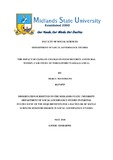Please use this identifier to cite or link to this item:
https://cris.library.msu.ac.zw//handle/11408/3671| Title: | The impact of climate change on food security and rural women: case study of Tsholotsho ward 6,12 and 13 | Authors: | Manomano, Mercy | Keywords: | Climate change Weather patterns |
Issue Date: | 2018 | Publisher: | Midlands State University | Abstract: | Climate change is a change in the statistical distribution of weather patterns when that change lasts for an extended period of time for example decades to millions of years. It is caused by factors such as biotic processes, variations in solar radiation received by Earth, plate tectonics and volcanic eruptions. Tsholotsho district is one of the most affected districts in the country by climate change. It has been rated number 7 out of 10 districts in terms of drought. The study seeks to assess the Impact of Climate Change on Food Security and Rural Women in Tsholotsho focusing on ward 6, 12 and 13. The research objectives of the study include, to determine the nature of climate change common in Tsholotsho, to examine the extent women are affected by climate change in the district. To add more it seeks to examine the extent climate change impacts on food security, to explore the Indigenous knowledge systems used to mitigate against climate change and to examine policies and legislation on climate change in Zimbabwe. Literature related pointed out that there are certain challenges of climate change faced mainly by women since they are the most vulnerable group, policies on climate change and food security as well as the impact of climate change on food security were also pointed out only to mention a few. Different theories such as sustainable livelihood theory, Local governance theory which were implemented in Viacha and Charagua were discussed as well as the Indigenous Knowledge System. The researcher used purposive sampling and simple random sampling as sampling techniques to gather data. Primary and secondary data collection methods were used as collection methods through the use of questionnaires, interviews and focus groups discussions to gather data. Data gathered was presented and analyzed using tables, pie charts, graphs and also in an analytical manner. The findings of the study revealed that men are more informed on climate change issues yet women are the victims as well as the most vulnerable group pertaining to climate changes, women are also less represented in policy making and decision making on to mention a mention a few. The findings revealed that women should be represented especially on issues affects them and policies on climate change should also be devolved to the local community for them to participate. The researcher recommended that there should be policies that are more effective from the central to the local level, some government departments such as District Development Fund should partner with NGOs for funding, borehole drilling and dam construction in order to save for dry seasons. | URI: | http://hdl.handle.net/11408/3671 |
| Appears in Collections: | Bsc Local Governance Studies Honours Degree |
Files in This Item:
| File | Description | Size | Format | |
|---|---|---|---|---|
| MERCY REVISED.pdf | Full Text | 1.68 MB | Adobe PDF |  View/Open |
Page view(s)
146
checked on Feb 26, 2025
Download(s)
302
checked on Feb 26, 2025
Google ScholarTM
Check
Items in MSUIR are protected by copyright, with all rights reserved, unless otherwise indicated.


